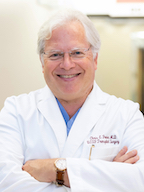Peter G. Stock, M.D., Ph.D.
- Professor of Surgery
- Surgical Director, Kidney and Pancreas Transplant Program
- Surgical Director, Pediatric Renal Transplant Program
- Co-Director, Pancreatic Islet Cell Transplant Program
- Program Director, T32 Training Program in Transplant Surgery
Contact Information
Education
- University of Illinois, Urbana, IL, B.S., Biology, 1974-78
- University of Illinois, Chicago, IL, M.D., Medicine, 1978-82
- University of Minnesota, Minneapolis, MN, Ph.D., Surgery, 1985-92
Residencies
- University of Minnesota, Intern, General Surgery, 1982-83
- University of Minnesota, Resident, General Surgery, 1983-90
Clinical Expertise
- Bile Duct Injuries
- Bile Duct Strictures
- Cholangiocarcinoma (Bile Duct Cancer)
- Choledochal Cyst Disease
- Dialysis Access
- End-Stage Kidney Disease
- Fulminant Hepatic Failure
- Hepatitis B
- Hepatitis C
- Hepatocellular Carcinoma (Liver Cancer)
- Kidney and LIver Transplantation in HIV Patients
- Kidney Transplantation
- Liver Transplantation
- Living Donor Kidney Transplantation
- Living Donor Liver Transplantation
- Pancreas Transplantation
- Pancreatic Islet Cell Transplantation
- Pediatric Kidney Transplantation
- Pediatric Liver Transplantation
- Polycystic Kidney Disease
- Polycystic Liver Disease
- Portal Hypertension
Biography
Peter G. Stock, M.D., Ph.D. is Professor of Surgery at UCSF, Surgical Director of the Pediatric Renal Transplantation Program and Surgical Director of the Pancreas Transplant Program. He was trained at the University of Minnesota, completing a surgical residency before coming to UCSF for a transplant fellowship. He joined the UCSF faculty in 1992. Dr. Stock specializes in liver, kidney and pancreas transplantation.
For many years, Dr. Stock was Chair of the Department of Surgery Research Committee. Under his outstanding leadership. he has helped to establish UCSF Surgery as one of the top research programs for surgical residents in the U.S.
A clincial investigation on which Dr. Stock served as principal investigator led the passage of the Hope Act lifting the ban on research for transplanting organs between HIV-positive donors and recipients.
Dr. Stock is a frequent presenter on issues related to transplantation and immunosuppression, and holds membership in numerous professional and honorary societies.
TEACHING AND MENTORING ACTIVITY
Teaching Summary: My teaching responsibilities for the last three years continue to focus on my role as a transplant surgeon, and are directed toward medical students, residents, fellows and junior faculty – I view this as one of my most important roles at UCSF. Teaching is conducted during daily rounds, in the operating room during transplant surgeries, and in the outpatient liver and pancreas clinics. In the last 3 years, I have been recognized twice for receiving evaluations from the surgery residents for having outstanding evaluation scores significantly exceeding the mean scores of faculty in the formal MedHub system (Surgery 450/455 – evaluations/recognition submitted).
For the medical students, I taught the class on transplantation (Surgery 110) in person (six times per year) until 2020, when it became virtual. I continue to be the Course Director for Surgery 140.18, Advanced Studies in Solid Organ Transplantation. This subinternship is for 4th year medical students interested in pursuing a surgical residency and fosters important relationships with top candidates for surgical residency. For the UCSF medical and graduate students, I serve as a lecturer for the GEMS NS219: Introduction to Human Biology and Medicine. This course is designed to attract graduate students into specific areas of translational research. My lecture focuses on strategies for beta cell replacement (pancreas/islet/stem cell-derived islets) as a cure for diabetes mellitus, and includes patient interviews with recipients of pancreas and islet transplants (course evaluations submitted).
Mentoring Summary: At the departmental level, I continue to serve on the Resident Research Committee (Chair until 2020), and am responsible for the curriculum development for the surgery residents during their research years. Until 2020, I provided mentorship to all categorical surgery residents to help define a pathway consistent with their goals. Since stepping down as Chair in 2020, my principal focus is on developing a research pathway for residents pursuing research in transplant or transplant-related fields (2 residents per year). This involves meeting with interns, R2's and R3's as they develop research plans and strategies for funding (at least 5 hours per categorical resident per year during the first 3 years), as well as monitoring progress of all research residents. The research and training plans are focused on the strategy outlined in the NIH T32 training grant (T32A112522 – Filling a Void of Research Transplant Training for Transplant Surgeon). I am the PI of this training grant, which has been highly successful in the training of the first group of residents that have completed the program (08/2016-07/2021); we just received a renewal (08/24/2021-07/31/2026).
My mentorship in translational research (pancreatic islets and HIV immunology) has included medical students, residents and transplant fellows during the period since the last advancement (last 3 years). During the last 3 years, primary mentorship for committed research (2 years) has included: Dominic Amara (medical student/gap year), Simon Chu (medical student/now surgery resident), Casey Ward (surgery resident), Yvonne Kelly (surgery resident), Arya Zarinsefat (surgery resident), Hillary Braun (surgery resident), Audrey Brown (surgery resident), and Steve Wisel (surgery resident/transplant fellow). The success of these mentees is evidenced by the Awards that these students and residents have achieved: Hillary Brown and Casey Ward both won the top award for best research at the UCSF Resident Research Symposium. Dominic Amara was awarded the Presidential Award for medical students from the ASTS. Audrey Brown and Yvonne Kelly both were awarded research grants from the ASTS. Arya Zarinsefat also received an award for his research at Resident Research Day, as well as getting intramural funding for his work with the immune response following transplantation in the HIV positive recipient.
I continue to mentor all of my junior colleagues with regards to surgery/clinical transplantation. For the last 3 years, my focus has been on the three most junior colleagues: Garrett Roll (NIH clinical trials), Shareef Syed (surgical education), and James Gardner (translational research).
Awards & Honors
Research Overview
- Improving the outcomes of solid organ transplantation in people with HIV and translational studies bridging the previously distinct worlds of HIV and transplantation. Related funding during last 3 years: A) NIH U01Al118594-05 – Impact of CCR5 Blockade in HIV+ Kidney Transplant Recipients (Stock PI)(active until 07/31/2021); B) NIH U01 Hope in Action Prospective Multi-Center Trial (Stock Site PI)(active until 07/31/3021); C) NIHU01 Al152153-01 – Maximizing the success of HIV+ to HIV+ Kidney Transplantation in South Africa (Stock Co-Investigator)(active until 03/31/2025); D) NIH U01 A1115714-03 Sofusbuvir and Ledipasvir in HIV/HCV Coinfected Pre and Post Liver Transplant (Stock PI)(funding ended 12/31/19); E) American Foundation for AIDS Research (amfAR) 109119-57-RGRL – Impact of Everolimus on HIV Persistence Post Kidney or Liver Transplant (Stock PI)(funding ended 01/31/2018).
- Beta Cell Replacement strategies for the treatment of diabetes mellitus with pancreas transplantation, islet transplantation, or stem cell-derived beta cell clusters. We were funded ($11-million dollar grant) from CIRM to develop the forearm as a site for islet cell transplantation. This novel approach uses co-transplantation of islets with parathyroid tissue to facilitate engraftment – and has the potential for the development of a safe and accessible site for stem cell-derived beta cells. Related funding during last 3 years: A) California Institute for Regenerative Medicine (CIRM) – Islet and PARAthyroid Co-Transplantation for Treatment of Diabetes in Intra-Muscular Site (PARADIGM) (Stock PI) (active until 06/30/2023); B) NIH/NIDDK P30 DK063720 Diabetes Endocrinology Research Center (Stock Director of the Islet Production Core, German PI) (funding end 03/31/2020, renewal pending).
- Public Policy/Organ Allocation: During the last 3 years, I continue to have an active role in the development of national allocation policy. Based on previous experience as the Chair of both the national pancreas and kidney committees of UNOS, I have been funded as a senior investigator of the Scientific Registry of Transplant Recipients (SRTR). The SRTR is contracted by the government (HRSA) to provide analysis based on the national data registry to guide policy development. Related funding during last 3 years: HSRA 75R60220C00011 (annual funding – contract to continue thru 2025).
Pancreatic Islet Transplantation
The translational research in the field of pancreatic islets revolves around clinical trials of the safety and efficacy of islet transplantation in patients with Type I diabetes. The clinical trials are funded by the National Institutes of Health (NIH) and the Juvenile Diabetes Research Foundation (JDRF). These clinical trials focus on novel immunosuppressive strategies that utilize co-stimulatory blockade to prevent the immune response against pancreatic islets with a regimen that is not toxic to kidneys or beta cells.
Related research involves improving the techniques required for isolating pancreatic islets from the pancreas, which is being conducted in a fully compliant GMP laboratory facility. The study of the alloimmune and autoimmune response following islet transplantation will be conducted to determine the efficacy of the immunosuppressive strategies. Further translational studies will include methods of expanding the source of beta cells, using direct proliferation, as well as manipulation of precursor cells localized in the adult pancreas. We are currently funded (PI) for a translational grant from California Institute of Regenerative Medicine (CIRM) to bring embryonic stem cell-derived beta cells to a clinical trial.
Solid Organ Transplantation in People with HIV
With the advent of highly active anti-retroviral therapy (HAART), HIV has been a chronic disease. People with HIV are no longer dying from progression of HIV to AIDS, but rather as a result of end stage live disease (viral hepatitis co-infection) and kidney disease (HIV nephropathy). Our laboratory heads up the large NIH-sponsored national multicenter trial which is studying the safety and efficacy of solid organ transplantation in people with HIV. Translational research is exploring the impact of HIV on organ function and the impact of immunosuppression on the immune response against HIV and associated copathogens.
Research & Funding
- Filling a Void of Research (FAVOR) Training for Transplant SurgeonsSponsor: NIH/NIAIDSponsor ID: T32AI125222Funding Period:Aug 2016-Jul 2021Principal Investigator
- Impact of CCR5 Blockade in HIV+ Kidney Transplant RecipientsSponsor: NIH/NIAIDSponsor ID: U01AI118594Funding Period:Aug 2015-Jul 2020Principal Investigator
- Diabetes Research CenterSponsor: NIH/NIDDKSponsor ID: P30DK063720Funding Period:Sep 2002-Mar 2020Co-Investigator
- Sofosbuvir and Ledipasvir in HIV/HCV Coinfected Pre and Post Liver TransplantSponsor: NIH/NIAIDSponsor ID: U01AI115714Funding Period:Jan 2015-Dec 2017Principal Investigator
- Solid Organ Transplantation in HIV: Multi-Site StudySponsor: NIH/NIAIDSponsor ID: U01AI052748Funding Period:Aug 2003-Aug 2013Principal Investigator
- General Clinical Research CenterSponsor: NIH/NCRRSponsor ID: M01RR000079Funding Period:Dec 1974-Mar 2009Co-Investigator
Clinical Trials
- Study ID: NCT03977662Start Date: Jul 2019Estimated Completion Date: Jun 2023Condition(s): Diabetes, Diabetes Type 1
- Study ID: NCT03500315Start Date: Apr 2018Estimated Completion Date: Aug 2022Condition(s): HIV/AIDS, Kidney Transplant
- Study ID: NCT02741323Start Date: Jan 2017Estimated Completion Date: Jul 2022Condition(s): HIV/AIDS, Kidney Disease, Kidney Transplant
- Study ID: NCT02533934Start Date: Aug 2016Estimated Completion Date: Dec 2019Condition(s): HIV/AIDS, Hepatitis C, Cirrhosis, Fibrosis, Liver Transplant
- Study ID: NCT02429869Start Date: Feb 2016Estimated Completion Date: Jan 2018Condition(s): HIV/AIDS, Kidney Transplant, Liver Transplant
- Study ID: NCT01856257Start Date: Jul 2013Estimated Completion Date: Apr 2016Condition(s): Primary Renal Allograft Candidate, Kidney Transplant
- Study ID: NCT01790594Start Date: Feb 2013Estimated Completion Date: Aug 2016Condition(s): Simultaneous Kidney and Pancreas Transplantation, Kidney Transplant
- Study ID: NCT00501709Start Date: Feb 2007Estimated Completion Date: Dec 2016Condition(s): Diabetes, Diabetes Type 1
- Study ID: NCT00074386Start Date: Oct 2003Estimated Completion Date: Aug 2013Condition(s): HIV/AIDS, Kidney Disease, Liver Disease, Liver Transplant
Featured Peer Reviewed Publications
- Kandaswamy R, Stock PG, Gustafson SK, Skeans MA, Curry MA, Prentice MA, Fox A, Israni AK, Snyder JJ, Kasiske BL. OPTN/SRTR 2016 Annual Data Report: Pancreas. Am J Transplant. 2018 Jan;18 Suppl 1:114-171. PMID: 29292605
- Schuetz C, Anazawa T, Cross SE, Labriola L, Meier RPH, Redfield RR 3rd, Scholz H, Stock PG, Zammit NW; IPITA YIC Young Investigator Committee. β Cell Replacement Therapy: The Next 10 Years. Transplantation. 2018 Feb;102(2):215-229. PMID: 28885496
- Piemonti L, de Koning EJP, Berney T, Odorico JS, Markmann JF, Stock PG, Rickels MR. Defining outcomes for beta cell replacement therapy: a work in progress. Diabetologia. 2018 Jun;61(6):1273-1276. PMID: 29511779
- Sneddon JB, Tang Q, Stock P, Bluestone JA, Roy S, Desai T, Hebrok M. Stem Cell Therapies for Treating Diabetes: Progress and Remaining Challenges. Cell Stem Cell. 2018 Jun 1;22(6):810-823. PMID: 29859172
- Rickels MR, Stock PG, de Koning EJP, Piemonti L, Pratschke J, Alejandro R, Bellin MD, Berney T, Choudhary P, Johnson PR, Kandaswamy R, Kay TWH, Keymeulen B, Kudva YC, Latres E, Langer RM, Lehmann R, Ludwig B, Markmann JF, Marinac M, Odorico JS, Pattou F, Senior PA, Shaw JAM, Vantyghem MC, White S. Defining Outcomes for β-Cell Replacement Therapy in the Treatment of Diabetes: a Consensus Report on the Igls Criteria from the IPITA/EPITA Opinion Leaders Workshop. Transplantation. 2018 Sep;102(9):1479-1486. PMID: 29528967
- Durand CM, Halpern SE, Bowring MG, Bismut GA, Kusemiju OT, Doby B, Fernandez RE, Kirby CS, Ostrander D, Stock PG, Mehta S, Turgeon NA, Wojciechowski D, Huprikar S, Florman S, Ottmann S, Desai NM, Cameron A, Massie AB, Tobian AAR, Redd AD, Segev DL. Organs from deceased donors with false-positive HIV screening tests: An unexpected benefit of the HOPE act. Am J Transplant. 2018 10; 18(10):2579-2586. PMID: 29947471. PMCID: PMC6160348
- Mock C, Debas H, Balch CM, Brennan M, Buyske J, Cusack J, DeMeester S, Herndon D, Le Holterman AX, Jaffe B, Kandil E, Kauffman G, Mazariegos G, sMerchant N, Numann P, Oleynikov D, Olutoye O, O'Neill J, Shackford S, Stock P, Tarpley JL, Tuttle T, Wolf S, Wren SM, Yang GP. Global Surgery: Effective Involvement of US Academic Surgery: Report of the American Surgical Association Working Group on Global Surgery. Ann Surg. 2018 10; 268(4):557-563. PMID: 30004921
- Yamanaga S, Rosario A, Fernandez D, Kobayashi T, Tavakol M, Stock PG, Kang SM. Inferior long-term graft survival after end-to-side reconstruction for two renal arteries in living donor renal transplantation. PLoS One. 2018; 13(7):e0199629. PMID: 29995911. PMCID: PMC6040747
- Kelly AC, Smith KE, Purvis WG, Min CG, Weber CS, Cooksey AM, Hasilo C, Paraskevas S, Suszynski TM, Weegman BP, Anderson MJ, Camacho LE, Harland RC, Loudovaris T, Jandova J, Molano DS, Price ND, Georgiev IG, Scott WE, Manas DMD, Shaw JAM, O'Gorman D, Kin T, McCarthy FM, Szot GL, Posselt AM, Stock PG, Karatzas T, Shapiro AMJ, Lynch RM, Limesand SW, Papas KK. Oxygen Perfusion (Persufflation) of Human Pancreata Enhances Insulin Secretion and Attenuates Islet Proinflammatory Signaling. Transplantation. 2019 01; 103(1):160-167. PMID: 30095738. PMCID: PMC6371803
- Kandaswamy R, Stock PG, Gustafson SK, Skeans MA, Urban R, Fox A, Odorico JS, Israni AK, Snyder JJ, Kasiske BL. OPTN/SRTR 2017 Annual Data Report: Pancreas. Am J Transplant. 2019 02; 19 Suppl 2:124-183. PMID: 30811891
- Chapman JR, Stock P, Haberal M. Organs From Executed People Are Not a Source of Scientific Discovery. Transplantation. 2019 Aug; 103(8):1534-1535. PMID: 31349354
- Roll GR, Webber AB, Gae DH, Laszik Z, Tavakol M, Mayen L, Cunniffe K, Syed S, Hirose R, Freise C, Feng S, Roberts JP, Ascher NL, Stock PG, Rajalingam R. A virtual crossmatch based strategy facilitates sharing of deceased donor kidneys for highly sensitized recipients. Transplantation. 2019 Aug 19. PMID: 31449187
- Kandaswamy R, Stock PG, Gustafson SK, Skeans MA, Urban R, Fox A, Israni AK, Snyder JJ, Kasiske BL. OPTN/SRTR 2018 Annual Data Report: Pancreas. Am J Transplant. 2020 Jan; 20 Suppl s1:131-192. PMID: 31898415
- Brian R, Stock P, Syed S, Hirose K, Reilly L, O'Sullivan P. How COVID-19 inspired surgical residents to rethink educational programs. Am J Surg. 2020 Oct 21. PMID: 33109334. PMCID: PMC7577268
- Roll GR, Posselt AM, Freise J, Baird J, Syed S, Mo Kang S, Hirose R, Szot GL, Zarinsefat A, Feng S, Worner G, Sarwal M, Stock PG. Long-term follow-up of beta cell replacement therapy in 10 HIV-infected patients with renal failure secondary to type 1 diabetes mellitus. Am J Transplant. 2020 Jan 28. PMID: 31994295
- Witkowski P, Philipson L, Kaufman DB, Ratner L, Abouljoud MS, Bellin M, Buse J, Kandeel F, Stock P, Mulligan D, Markmann JF, Kozlowski T, Andreoni K, Alejandro R, Baidal D, Hardy MA, Wickrema A, Mirmira RG, Fung J, Becker Y, Josephson MA, Bachul PJ, Pyda JS, Charlton M, Millis JM, Gaglia J, Stratta RJ, Fridell JA, Niederhaus S, Forbes RC, Jayant K, Robertson RP, Odorico J, Levy M, Harland R, Abrams PL, Olaitan OK, Kandaswamy R, Wellen J, Japour AJ, Desai CS, Naziruddin B, Balamurugan AN, Barth RN, Ricordi C. The Demise of Islet Allotransplantation in the US: A Call for an Urgent Regulatory Update The PMID: 33251712
- Stock PG, Mannon RB, Armstrong B, Watson N, Ikle D, Robien MA, Morrison Y, Odorico J, Fridell J, Mehta AK, Newell KA. Challenges of calcineurin inhibitor withdrawal following combined pancreas and kidney transplantation: Results of a prospective, randomized clinical trial. Am J Transplant. 2020 Feb 10. PMID: 32039559
- Peters MG, Kottilil S, Terrault N, Amara D, Husson J, Huprikar S, Florman S, Sulkowski MS, Durand CM, Luetkemeyer AF, Rogers R, Grab J, Haydel B, Blumberg E, Dove L, Emond J, Olthoff K, Smith C, Fishbein T, Masur H, Stock PG. Retrospective-Prospective Study of Safety and Efficacy of Sofosbuvir based Direct Acting Antivirals in HIV/HCV Coinfected Participants with Decompensated Liver Disease Pre or Post Liver Transplant. Am J Transplant. 2020 Dec 04. PMID: 33277801
- Fozouni L, Mohamad Y, Lebsack A, Freise C, Stock P, Lai JC. Frailty Is Associated With Increased Rates of Acute Cellular Rejection Within 3 Months After Liver Transplantation. Liver Transpl. 2020 Mar; 26(3):390-396. PMID: 31655014. PMCID: PMC7036016
- Wall AE, Pruett T, Stock P, Testa G. Coronavirus disease 2019: Utilizing an ethical framework for rationing absolutely scarce health-care resources in transplant allocation decisions. Am J Transplant. 2020 Apr 13. PMID: 32282992
- Braun HJ, Dodge JL, Grab JD, Schwab ME, Liu IH, Glencer AC, Stock PG, Hirose R, Roberts JP, Ascher NL. Live Donor Liver Transplantation in the United States: Impact of Share 35 on Live Donor Utilization. Transplantation. 2020 May 18. PMID: 32433235
- Mannon RB, Armstrong B, Stock PG, Mehta AK, Farris AB, Watson N, Morrison Y, Sarwal M, Sigdel T, Bridges N, Robien M, Newell KA, Larsen CP. Avoidance of CNI and steroids using belatacept-Results of the Clinical Trials in Organ Transplantation 16 trial. Am J Transplant. 2020 Jun 18. PMID: 32558199
- Syed SM, Gardner J, Roll G, Webber A, Mehta N, Shoji J, Adelmann D, Niemann C, Braun HJ, Mello A, Yao F, Posselt A, Kang SM, Hirose R, Roberts J, Feng S, Ascher N, Stock P, Freise C. COVID-19 and Abdominal Transplant: A Stepwise Approach to Practice During Pandemic Conditions. Transplantation. 2020 Jun 29. PMID: 32639408. PMCID: PMC7363383
- Markmann JF, Rickels MR, Eggerman TL, Bridges ND, Lafontant DE, Qidwai J, Foster E, Clarke WR, Kamoun M, Alejandro R, Bellin M, Chaloner K, Czarniecki CW, Goldstein JS, Hering BJ, Hunsicker LG, Kaufman DB, Korsgren O, Larsen CP, Luo X, Naji A, Oberholzer J, Posselt AM, Ricordi C, Senior PA, Shapiro A, Stock PG, Turgeon NA. Phase 3 Trial of Human Islet-after-Kidney Transplantation in Type 1 Diabetes. Am J Transplant. 2020 Jul 06. PMID: 32627352
- Durand CM, Zhang W, Brown DM, Yu S, Desai N, Redd AD, Bagnasco SM, Naqvi FF, Seaman S, Doby BL, Ostrander D, Bowring MG, Eby Y, Fernandez RE, Friedman-Moraco R, Turgeon N, Stock P, Chin-Hong P, Mehta S, Stosor V, Small CB, Gupta G, Mehta SA, Wolfe CR, Husson J, Gilbert A, Cooper M, Adebiyi O, Agarwal A, Muller E, Quinn TC, Odim J, Huprikar S, Florman S, Massie AB, Tobian AAR, Segev DL. A prospective multicenter pilot study of HIV-positive deceased donor to HIV-positive recipient kidney transplantation: HOPE in action. Am J Transplant. 2020 Jul 23. PMID: 32701209
- Stock PG, Wall A, Gardner J, Domínguez-Gil B, Chadban S, Muller E, Dittmer I, Tullius SG. Ethical Issues in the COVID Era: Doing the Right Thing Depends on Location, Resources, and Disease Burden. Transplantation. 2020 Jul; 104(7):1316-1320. PMID: 32569002. PMCID: PMC7340125
- Yamanaga S, Freise CE, Stock PG, Rosario A, Fernandez D, Kobayashi T, Tavakol M, Kang SM. Inferior Long-Term Graft Survival of Suboptimal Kidneys After Living Donor Kidney Transplantation. Transplant Proc. 2020 Jul - Aug; 52(6):1734-1740. PMID: 32446691
- Henrich TJ, Schreiner C, Cameron C, Hogan LE, Richardson B, Rutishauser RL, Deitchman AN, Chu S, Rogers R, Thanh C, Gibson EA, Zarinsefat A, Bakkour S, Aweeka F, Busch MP, Liegler T, Baker C, Milush J, Deeks SG, Stock PG. Everolimus, an mTORC1/2 inhibitor, in ART-suppressed individuals who received solid organ transplantation: A prospective study. Am J Transplant. 2020 Aug 11. PMID: 32780519
- Meier RPH, Noguchi H, Kelly YM, Sarwal M, Conti G, Ward C, Halleluyan R, Tavakol M, Stock PG, Freise CE. Impact of Sarcopenia on Simultaneous Pancreas and Kidney Transplantation Outcomes: A Retrospective Observational Cohort Study. Transplant Direct. 2020 Oct; 6(10):e610. PMID: 33062843. PMCID: PMC7523826
- Muller E, Botha FCJ, Barday ZA, Manning K, Chin-Hong P, Stock P. Kidney Transplantation in HIV Positive Patients: Current Practice and Management Strategies. Transplantation. 2020 Oct 08. PMID: 33044431
- Amara D, Braun HJ, Shui AM, Sorrentino T, Ramirez JL, Lin J, Liu IH, Mello A, Stock PG, Hiramoto JS. Long-Term Lower Extremity and Cardiovascular Complications after Simultaneous Pancreas-Kidney Transplant. Clin Transplant. 2020 Dec 19; e14195. PMID: 33340143
- Amara D, Wisel SA, Braun HJ, Collisson EA, Friedlander T, Worner G, Roll GR, Hirose R, Stock PG. Metastatic Donor-derived Malignancies Following Simultaneous Pancreas-kidney Transplant: Three Case Reports and Management Strategies. Transplant Direct. 2021 Jan; 7(1):e636. PMID: 33324741. PMCID: PMC7725258
- Kandaswamy R, Stock PG, Miller J, Skeans MA, White J, Wainright J, Kyaw NTT, Niederhaus S, Israni AK, Snyder JJ. OPTN/SRTR 2019 Annual Data Report: Pancreas. Am J Transplant. 2021 Feb; 21 Suppl 2:138-207. PMID: 33595197
- Roll GR, Lunow-Luke T, Braun HJ, Buenaventura O, Mallari M, Stock PG, Rajalingam R. COVID-19 does not impact HLA antibody profile in a series of waitlisted renal transplant candidates. Hum Immunol. 2021 Apr 17. PMID: 33910707. PMCID: PMC8052475
- Landstra CP, Andres A, Chetboun M, Conte C, Kelly Y, Berney T, de Koning EJP, Piemonti L, Stock PG, Pattou F, Vantyghem MC, Bellin MD, Rickels MR. Examination of the Igls Criteria for Defining Functional Outcomes of ß-Cell Replacement Therapy: IPITA symposium report. J Clin Endocrinol Metab. 2021 Jun 01. PMID: 34061967
- Danovitch G, Bunnapradist S, Cohen D, Hariharan S, McKay D, Ratner L, Stegall M, Steiner R, Stock P, Vincenti F. Tests for the non-invasive diagnosis of kidney transplant rejection should be evaluated by kidney transplant programs. Am J Transplant. 2021 Jun 03. PMID: 34080294
- Israni A, Wey A, Thompson B, Miller J, Casingal V, Pavlakis M, Niederhaus S, Forbes R, Wilk A, McKinney W, Kandaswamy R, Stock P, Snyder J. New Kidney and Pancreas Allocation Policy: Moving to a Circle as the First Unit of Allocation. J Am Soc Nephrol. 2021 Jun 17. PMID: 34140395
- Stock PG, Henrich TJ, Segev DL, Werbel WA. Interpreting and addressing suboptimal immune responses after COVID-19 vaccination in solid organ transplant recipients. J Clin Invest. 2021 Jun 18. PMID: 34143755
- Stock PG, Lentine KL. Maximizing the use of hard to place kidneys: Getting the right kidney to the right recipient at the right time. Am J Transplant. 2021 Jul 30. PMID: 34327810
- Werbel WA, Brown DM, Kusemiju OT, Doby BL, Seaman SM, Redd AD, Eby Y, Fernandez RE, Desai NM, Miller J, Bismut GA, Kirby CS, Schmidt HA, Clarke WA, Seisa M, Petropoulos CJ, Quinn TC, Florman SS, Huprikar S, Rana MM, Friedman-Moraco RJ, Mehta AK, Stock PG, Price JC, Stosor V, Mehta SG, Gilbert AJ, Elias N, Morris MI, Mehta SA, Small CB, Haidar G, Malinis M, Husson JS, Pereira MR, Gupta G, Hand J, Kirchner VA, Agarwal A, Aslam S, Blumberg EA, Wolfe CR, Myer K, Wood RP, Neidlinger N, Strell S, Shuck M, Wilkins H, Wadsworth M, Motter JD, Odim J, Segev DL, Durand CM, Tobian AAR, HOPE in Action Investigators. National Landscape of HIV+ Deceased Organ Donors in the United States. Clin Infect Dis. 2021 Aug 28. PMID: 34453519
- Boggi U, Vistoli F, Andres A, Arbogast HP, Badet L, Baronti W, Bartlett ST, Benedetti E, Branchereau J, Burke GW, Buron F, Caldara R, Cardillo M, Casanova D, Cipriani F, Cooper M, Cupisti A, Davide J, Drachenberg C, de Koning EJP, Ettorre GM, Fernandez Cruz L, Fridell JA, Friend PJ, Furian L, Gaber OA, Gruessner AC, Gruessner RWG, Gunton JE, Han DJ, Iacopi S, Kauffmann EF, Kaufman D, Kenmochi T, Khambalia HA, Lai Q, Langer RM, Maffi P, Marselli L, Menichetti F, Miccoli M, Mittal S, Morelon E, Napoli N, Neri F, Oberholzer J, Odorico JS, Öllinger R, Oniscu G, Orlando G, Ortenzi M, Perosa M, Perrone VG, Pleass H, Redfield RR, Ricci C, Rigotti P, Paul Robertson R, Ross LF, Rossi M, Saudek F, Scalea JR, Schenker P, Secchi A, Socci C, Sousa Silva D, Squifflet JP, Stock PG, Stratta RJ, Terrenzio C, Uva P, Watson CJE, White SA, Marchetti P, Kandaswamy R, Berney T. First World Consensus Conference on pancreas transplantation: Part II - recommendations. Am J Transplant. 2021 Sep; 21 Suppl 3:17-59. PMID: 34245223. PMCID: PMC8518376
- Braun HJ, Amara D, Shui AM, Stock PG, Hirose R, Delmonico FL, Ascher NL. International Travel for Liver Transplantation: A Comprehensive Assessment of the Impact on the United States Transplant System. Transplantation. 2021 Oct 04. PMID: 34608102
- Kates OS, Stock PG, Ison MG, Allen RDM, Burra P, Jeong JC, Kute V, Muller E, Nino-Murcia A, Wang H, Wall A. Ethical review of COVID-19 vaccination requirements for transplant center staff and patients. Am J Transplant. 2021 Oct 27. PMID: 34706165. PMCID: PMC8653143
- Durand CM, Florman S, Motter JD, Brown D, Ostrander D, Yu S, Liang T, Werbel WA, Cameron A, Ottmann S, Hamilton JP, Redd AD, Bowring MG, Eby Y, Fernandez RE, Doby B, Labo N, Whitby D, Miley W, Friedman-Moraco R, Turgeon N, Price JC, Chin-Hong P, Stock P, Stosor V, Kirchner VA, Pruett T, Wojciechowski D, Elias N, Wolfe C, Quinn TC, Odim J, Morsheimer M, Mehta SA, Rana MM, Huprikar S, Massie A, Tobian AAR, Segev DL, HOPE in Action Investigators. HOPE in action: A prospective multicenter pilot study of liver transplantation from donors with HIV to recipients with HIV. Am J Transplant. 2021 Nov 06. PMID: 34741800
- Werlin EC, Braun HJ, Walker JP, Freise JE, Amara D, Liu IH, Mello A, Tavakol M, Stock PG, Hiramoto JS. Utility of a Simplified Iliac Artery Calcium Scoring System to Guide Perioperative Management for Renal Transplantation. Front Med (Lausanne). 2021; 8:606835. PMID: 33796543. PMCID: PMC8007790
- Markmann JF, Rickels MR, Eggerman TL, Bridges ND, Lafontant DE, Qidwai J, Foster E, Clarke WR, Kamoun M, Alejandro R, Bellin MD, Chaloner K, Czarniecki CW, Goldstein JS, Hering BJ, Hunsicker LG, Kaufman DB, Korsgren O, Larsen CP, Luo X, Naji A, Oberholzer J, Posselt AM, Ricordi C, Senior PA, Shapiro AMJ, Stock PG, Turgeon NA. Clinical Islet Transplantation Consortium. Phase 3 trial of human islet-after-kidney transplantation in type 1 diabetes. Am J Transplant. 2021;21:1477–1492. https://doi.org/10.1111/ ajt.16174
- Meier RPH, Kelly Y, Yamaguchi S, Braun HJ, Lunow-Luke T, Adelmann D, Niemann C, Maluf DG, Dietch ZC, Stock PG, Kang SM, Feng S, Posselt AM, Gardner JM, Syed SM, Hirose R, Freise CE, Ascher NL, Roberts JP, Roll GR. Advantages and Limitations of Clinical Scores for Donation After Circulatory Death Liver Transplantation. Front Surg. 2021; 8:808733. PMID: 35071316. PMCID: PMC8766343
- Chandran S and Stock PG. COVID-19 Vaccination in Kidney Transplant Recipients: An Ounce Pre-Transplant is Worth a Pound Post Transplant. JASN 32:2977-2978, 2021. doi:https//doi.org/10.1681/ASN.2021 101347
- Zarinsefat A, Gulati A, Shui A, Braun H, Rogers R, Hirose R, Ascher N, Stock P. Long-term Outcomes Following Kidney and Liver Transplant in Recipients With HIV. JAMA Surg. 2022 Jan 05. PMID: 34985513. PMCID: PMC8733865
- Ward C, Odorico JS, Rickels MR, Berney T, Burke GW, Kay TWH, Thaunat O, Uva PD, de Koning EJP, Arbogast H, Scholz H, Cattral MS, Stratta RJ, Stock PG, International Pancreas and Islet Transplant Association Beta-Cell Replacement Therapy Monitoring Tas. International Survey of Clinical Monitoring Practices in Pancreas and Islet Transplantation. Transplantation. 2022 Jan 10. PMID: 35019897
Books Chapters & Edited Books
- Zarinsefat A, Stock P. Islet vs. pancreas transplantation in nonuremic patients with type 1 diabetes. Transplantation, Bioengineering, and Regeneration of the Endocrine Pancreas. 2020 Jan 1; 417-423.
- Stock PG, Mukhtar R, Ghersin H, Fiscalini AS, and Esserman L. Pragmatic Trials and Approaches to Transforming Care. In: Pawlik T.,Sosa J. (eds). Clinical Trials. Success in Academic Surgery. Springer, Cham. 2020 March 11; 59-76. https://doi.org/10.1007/978-3-030-35488-6_6
- Locke J, Stock P. Renal Transplantation 7th Ed. Editor(s): Mulholland MW, Lillemoe KD, Doherty GM, Maier RV, Simeone DM, Unchurch Jr GR. G. Greenfield's Surgery: Scientific Principles and Practice: Lippincott Williams and Wilkens, Philadelphia. In press.
Videos
- Consequences of the New Allocation System for Kidney-Pancreas Transplants
- Interview with Peter Stock MD, PhD - ASTS President 2014-2015
- Transplantation to Cure Diabetes Mellitus: Past, Present, and Future - Update 2019
- Interactive Selection Meeting: Who Gets It And Who Doesn't Get It? - UCSF Kidney Transplant Program Update in Transplantation 2018
In the News
- UCSF News Services - Shelley Wong - June 13, 2019Researcher of the Month: Peter Stock, MD, PhD As a pivotal figure in HIV-to-HIV organ transplantation and its legalization through the passage of the HIV Organ Policy Equity (HOPE) Act, transplant surgeon Peter G. Stock, MD., PhD., continues to strive toward breakthroughs in research. While Stock is mostly known for his HIV transplantation work, he has been investigating pancreatic islet transplantation (also known as beta cell replacement) to cure type 1 diabetes since his days as a PhD [...]
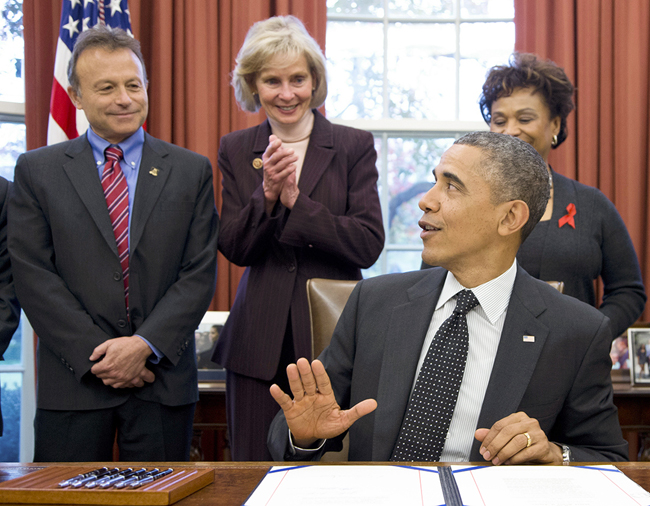
- Stem Cellar, The Official Blog of CIRM, California's Stem Cell Agency - Yimy Villa - May 23, 2019The California Institute for Regenerative Medicine (CIRM) awarded $11.08 Million to Dr. Peter Stock at the University of California San Francisco (UCSF) to conduct a clinical trial for treatment of Type 1 Diabetes (T1D)... The trial will be using parathyroid glands to aid in the success and viability of the transplant procedure. Co-transplantation of islets and parathyroid glands, from the same donor, substantially increases beta cell survival, potentially enabling adequate long-term [...]
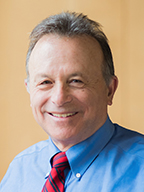
- UCSF Department of Surgery - Richard Barg - March 27, 2018The UCSF Department of Surgery now ranks No. 3 nationally in NIH research funding among all academic surgery programs, a stunning rise from 6th the last time the survey was done. Three Department of Surgery faculty also ranked in the top 20 of all NIH-funded principal investigators nationally in the category of surgery. The highly respected Blue Ridge Institute for Medical Research utilized data from the Research Portfolio Online Reporting Tool (RePORT) to survey U.S. medical schools for their [...]
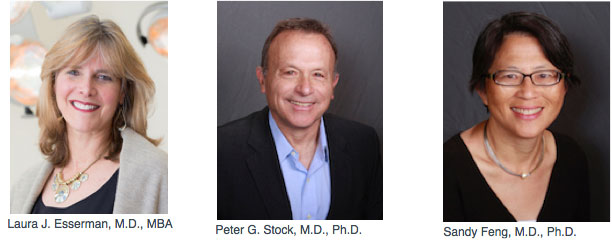
- UCSF Department of Surgery - Richard Barg - March 12, 2018Transplant surgeons Sandy Feng, M.D., Ph.D. and Peter G. Stock, M.D., Ph.D. continued their stellar records of accomplishment in garnering NIH funding for their cutting-edge clinical research, ranking in the top 20 of all NIH-Funded principal investigators in the category of surgery nationally for 2017. Stock ranked 8th and Feng 20th out of 534 investigators nationwide, both in the top 4%, this according to survey data analyzed by the highly respected Blue Ridge Institute for Medical Research. [...]

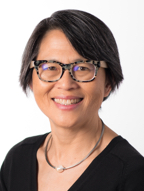
- UCSF Transplant Surgery - Richard Barg - June 26, 2017President Barack Obama signs the HOPE Act legislation in November 2013. Peter Stock (far left) had earlier testified before Congress in support of the legislation, which overturned a federal ban on HIV-to-HIV transplants. Photo by Evan Vucci UCSF News reports on the epic battle, led by UCSF transplant surgeon Peter G. Stock, M.D., Ph.D., to repeal long-standing federal and state laws banning HIV-to-HIV organ transplantation, this after having served as lead Principal Investigator on [...]

- UCSF Department of Surgery - Richard Barg - January 06, 2017The NIH has awarded the UCSF Department of Surgery a T32 training grant, "Filling a Void of Research Training for Transplant Surgeons" (FAVOR). The grant, awarded in August 2016, provides annual funding in the amount of $156,602 for in-depth training of three general surgery residents with an interest in transplant surgery during their two research years, the training to be focused on translational immunology. The program is led by Professors Peter G. Stock, M.D., Ph.D. and Minnie M. Sarwal [...]
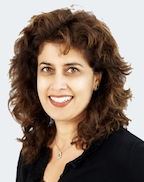

- UCSF Transplant Surgery - April 01, 2014"Researchers studying the effects of immune suppressant drugs on transplant patients with HIV have made a surprising discovery: A drug intended to hobble the body's defense system may actually help destroy dormant reservoirs of the virus that causes AIDS In a paper published this week in the American Journal of Transplantation, authors found that when a small group of transplant patients received the drug sirolimus, they experienced a two- to threefold drop in HIV levels, whereas patients who [...]

- UCSF Transplant Surgery - December 05, 2013President Barack Obama signs S. 330: HIV Organ Policy Equity Act during a signing ceremony in the Oval Office, Nov. 21, 2013. (Official White House Photo by Lawrence Jackson) MSNBC reports on President Obama's signing of a bill that ended a decades-old policy that banned organ donations from one HIV-positive person to another. A clinical trial led by UCSF transplant surgeon Peter G. Stock, M.D., Ph.D. was instrumental to the passage of the Hope Act that lifted the ban. The HIV Organ [...]
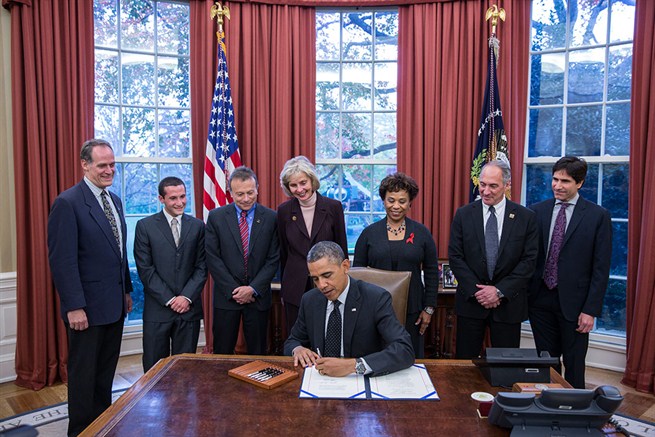
- UCSF Transplant Surgery - November 14, 2013UCSF News, reporting on the 14th World Congress of the International Pancreas and Islet Transplant Association (IPITA), highlighed improving results in islet cell transplantation: For the worst cases of type 1 diabetes, islet transplantation already has freed hundreds of people from complete dependence on insulin and from life-threatening consequences of the disease. "However, the procedure still is regarded as experimental by the U.S. Food and Drug Administration (FDA). Islets are [...]
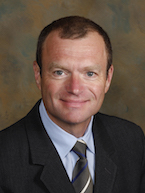
- UCSF Transplant Surgery - June 05, 2013"The sun wasn't up at 5 o'clock Wednesday morning, but a new day had already dawned for Matthew Ouimet. Matthew, a 2-year-old Antioch boy who had waited 15 months for a life-sustaining kidney and liver transplant, had his new organs. Dr. John Roberts took the lead on the liver transplant, and Dr. Peter Stock, who handled the kidney procedure in a 12-hour surgery that began around 6 p.m. Tuesday, delivered the good news to parents Kristi and Kelly Ouimet and a half-dozen family members who spent [...]
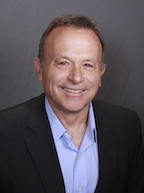
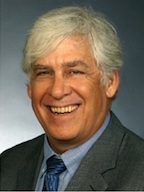
- UCSF Transplant Surgery - April 11, 2011Last year, a team led by Dr. Peter Stock of UCSF reported on results from a large multicenter study testing the safety and feasibility of transplanting kidneys where both the donor and recipients were infected with HIV, the virus that causes AIDS. The results, reported in the New England Journal of Medicine, showed that the recipients survived nearly as long as non-HIV infected recipients of kidney transplants. As a result of the Stock-led trial, and a just-published paper from Johns Hopkins [...]

- UCSF Transplant Surgery - March 23, 2011"Previously, Uruguay had tried to go it alone, but high mortality rates soon caused doctors to shut the program down. After their initial visit, the UCSF transplant team, including anesthesiologist Claus U. Niemann, MD (pictured first), and surgeons Ryutaro Hirose, MD (pictured second), and Peter Stock, MD, PhD, (pictured third) continued to consult with the team in Uruguay, guiding them through everything from patient selection procedures to the use of immunosuppressive medications [...]

- UCSF Transplant Surgery - November 18, 2010"People infected with the AIDS virus can safely receive a kidney transplant, researchers reported on Wednesday. The finding, published in Thursday's New England Journal of Medicine, is good news for people with HIV who are more prone to kidney disease, in part because of the drugs they must take to stay healthy. Before drug cocktails turned HIV from a death sentence to a chronic condition, patients were not eligible to receive a kidney. But now they can. 'Patient and graft survival are really [...]

- UCSF Transplant Surgery - February 01, 2005"The body's rejection of transplanted organs and tissues is an unfortunate risk of transplant surgery. Historically, rejection rates in a simultaneous pancreas-kidney (SPK) transplant have been as high as 80% and, in 2001, averaged nearly 20%. ........Diabetes Center surgeons Peter Stock, (left) and Chris Freise (right) have been pioneering new methods of immunosuppression for SPK transplants that do not rely upon steroids, with great success...... " Read Full Diabetes Center [...]
